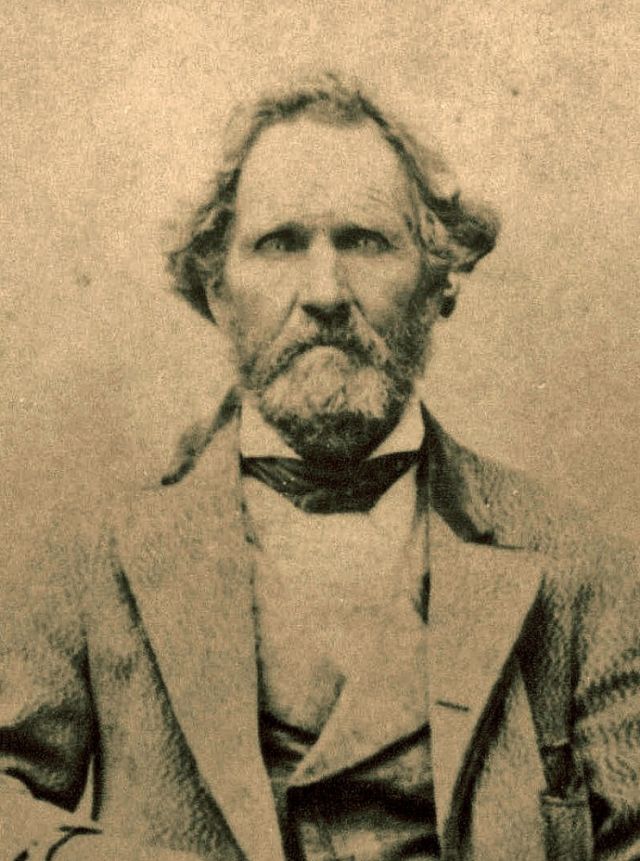Thomas Grover
(1807-1886)


D&C 124:132
By Susan Easton Black
At age twelve Thomas worked as a cabin boy aboard a barge on Lake Erie. As he grew to manhood, he became a captain on a freighter vessel that traversed the waterways from Quebec to New York City and westward to Buffalo.
By 1834, when he listened to the Prophet Joseph Smith preach, Thomas had given up the seafaring life for the gentler life of a Methodist preacher. It was the message of the Restoration preached by the Prophet Joseph that convinced Thomas to abandon his Methodist beliefs and enter the waters of baptism in September 1834. Desiring to be with others of his faith, he soon sold his farmland in Freedom, New York, for five hundred dollars and moved to Kirtland, Ohio.
Thomas was greeted in Kirtland by the Prophet Joseph, who said, “If ever God sent a man he sent you. I want every dollar … that you have got in the world.”1 Without hesitation, Thomas turned over to the Prophet his money from the sale of his property in New York. The money was used to purchase building materials for the Kirtland Temple. Thomas’s faithfulness did not stop with his financial contribution. He served on high councils in Kirtland, Ohio; Far West, Missouri; Nauvoo, Illinois; Cutler’s Park, Nebraska; and Salt Lake City and Farmington, Utah.
Thomas was numbered among the first to leave Nauvoo in the winter of 1846 to begin his journey to the Rocky Mountains. While crossing the Mississippi River, he lost most of his possessions. Brigham Young explained,
A filthy wicked man squirted some tobacco juice into the eyes of one of the oxen attached to Thomas Grover’s wagon, which immediately plunged into the river, dragging another ox with him, and as he was going overboard he tore off one of the side boards which caused the water to flow into the flatboat.2
The generosity of Latter-day Saints enabled Thomas to proceed across the river to Iowa and from there to the Rockies.
Thomas and his family had settled in the Salt Lake Valley when Brigham Young asked him to go to northern California to settle some disturbances that had arisen among the Saints in that area and collect their tithing. Not only did Thomas accomplish this, he joined with miners in searching for gold. When he returned to his family in the Salt Lake Valley, he was carrying with him over a hundred pounds of gold. According to his posterity, he gave in gold five hundred dollars towards the construction of the Salt Lake Temple.
Thomas also gave his time to build up small communities in Davis County, Utah. He served on the Davis High Council, as a representative of the county in the Utah legislature, and as a probate judge. With so much going for him and prosperity on all sides, it is little wonder that when the First Presidency of the Church dedicated a chapel in Farmington, Davis County, built on land donated by Thomas, they stayed in his home.
In 1887, when a US marshal tried to arrest Thomas for living the law of plural marriage, he exclaimed, “Get me Brother Joseph’s sword … and watch while I cut this man’s head off!”3 The marshal left without making an arrest.
On Sunday, February 16, 1886, when worship services had ended, “Thomas suddenly raised his hand and said: Wait a minute, Bishop. Then he added that he could not go home until he had borne testimony that the Gospel was true and that Joseph Smith was a true Prophet of God.”4 Four days later, on February 20, 1886, Thomas died of pneumonia in Farmington at age seventy-nine. His daughter said of him, “My father was loved by all who knew him. He never spoke evil of anyone; he did not boast, and he did not take honor unto himself. Many times he has divided his last meal with a sufferer. His word was as good as his bond. He could neither be bought nor sold.”5
1. Mark Grover, “The Life of Thomas Grover, Utah Pioneer,” 10. L. Tom Perry Special Collections, Harold B. Lee Library, Brigham Young University, Provo, UT.
2. Smith, History of the Church, 7:582.
3. Grover, “The Life of Thomas Grover, Utah Pioneer,” 43.
4. Andrew Jenson, LDS Biographical Encyclopedia, 4 vols. (Salt Lake City: Andrew Jenson History Company, 1901), 4:142.
5. Jenson, LDS Biographical Encyclopedia, 4:141.
Additional Resources
- Biography of Thomas Grover (josephsmithpapers.org)
